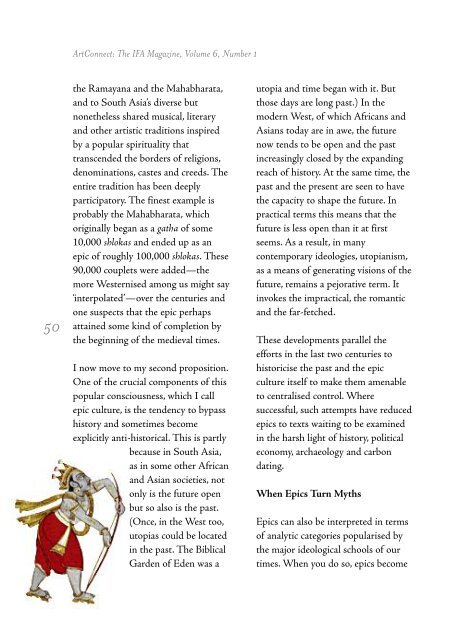Layout 3 - India Foundation for the Arts - IFA
Layout 3 - India Foundation for the Arts - IFA
Layout 3 - India Foundation for the Arts - IFA
You also want an ePaper? Increase the reach of your titles
YUMPU automatically turns print PDFs into web optimized ePapers that Google loves.
50<br />
ArtConnect: The <strong>IFA</strong> Magazine, Volume 6, Number 1<br />
<strong>the</strong> Ramayana and <strong>the</strong> Mahabharata,<br />
and to South Asia’s diverse but<br />
none<strong>the</strong>less shared musical, literary<br />
and o<strong>the</strong>r artistic traditions inspired<br />
by a popular spirituality that<br />
transcended <strong>the</strong> borders of religions,<br />
denominations, castes and creeds. The<br />
entire tradition has been deeply<br />
participatory. The finest example is<br />
probably <strong>the</strong> Mahabharata, which<br />
originally began as a gatha of some<br />
10,000 shlokas and ended up as an<br />
epic of roughly 100,000 shlokas. These<br />
90,000 couplets were added—<strong>the</strong><br />
more Westernised among us might say<br />
‘interpolated’—over <strong>the</strong> centuries and<br />
one suspects that <strong>the</strong> epic perhaps<br />
attained some kind of completion by<br />
<strong>the</strong> beginning of <strong>the</strong> medieval times.<br />
I now move to my second proposition.<br />
One of <strong>the</strong> crucial components of this<br />
popular consciousness, which I call<br />
epic culture, is <strong>the</strong> tendency to bypass<br />
history and sometimes become<br />
explicitly anti-historical. This is partly<br />
because in South Asia,<br />
as in some o<strong>the</strong>r African<br />
and Asian societies, not<br />
only is <strong>the</strong> future open<br />
but so also is <strong>the</strong> past.<br />
(Once, in <strong>the</strong> West too,<br />
utopias could be located<br />
in <strong>the</strong> past. The Biblical<br />
Garden of Eden was a<br />
utopia and time began with it. But<br />
those days are long past.) In <strong>the</strong><br />
modern West, of which Africans and<br />
Asians today are in awe, <strong>the</strong> future<br />
now tends to be open and <strong>the</strong> past<br />
increasingly closed by <strong>the</strong> expanding<br />
reach of history. At <strong>the</strong> same time, <strong>the</strong><br />
past and <strong>the</strong> present are seen to have<br />
<strong>the</strong> capacity to shape <strong>the</strong> future. In<br />
practical terms this means that <strong>the</strong><br />
future is less open than it at first<br />
seems. As a result, in many<br />
contemporary ideologies, utopianism,<br />
as a means of generating visions of <strong>the</strong><br />
future, remains a pejorative term. It<br />
invokes <strong>the</strong> impractical, <strong>the</strong> romantic<br />
and <strong>the</strong> far-fetched.<br />
These developments parallel <strong>the</strong><br />
ef<strong>for</strong>ts in <strong>the</strong> last two centuries to<br />
historicise <strong>the</strong> past and <strong>the</strong> epic<br />
culture itself to make <strong>the</strong>m amenable<br />
to centralised control. Where<br />
successful, such attempts have reduced<br />
epics to texts waiting to be examined<br />
in <strong>the</strong> harsh light of history, political<br />
economy, archaeology and carbon<br />
dating.<br />
When Epics Turn Myths<br />
Epics can also be interpreted in terms<br />
of analytic categories popularised by<br />
<strong>the</strong> major ideological schools of our<br />
times. When you do so, epics become


